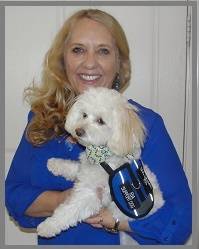How Do I Make My Dog a Service Dog

“
The only creatures that are evolved enough to convey pure love are dogs and infants.
Johnny Depp

These are some of the most frequently asked questions that I want to answer today, in as straight forward and factual way, as I can. There is so much misinformation on the internet, that people may be missing out on an opportunity to have an animal in their life to help them in so many ways, physically, emotionally or psychologically.
As a licensed therapist for 30 years, that does Psychological evaluations with clients through Next Generation Psychology at www.esapros.com we certify people to have an Emotional Support Animal (ESA) or a Psychiatric Service Dog (PSD).
The most frequent thing I hear from clients after getting an ESA or a PSD is that having my animal with them is a “life changer”. So, don’t let misinformation scare you off from seeing if you could qualify for a type of Service dog.

How do you get a service dog?
Service dogs come in many types for different disabilities and they have different laws that govern them.
If you have a medical condition, like seizures, diabetes, wheelchair bound or what we are most used to understanding as a traditional, service dog is for blindness. But there could be many types of medical conditions, if the dog, or a miniature horse, qualifies according to the Americans with Disability act (ADA).
What the ADA states as qualifying for a Service dog is: The ADA defines a service animal as a dog that is "individually trained" to "perform tasks for the benefit of an individual with a disability.”
The tasks a dog has been trained to provide must be directly related to the person’s disability. Service dogs have extensive training to behave calmly in public and perform specific tasks related to their owners’ physical or psychiatric disabilities.
Some states have laws that provide broader protection than the ADA. For example, while the ADA only applies to qualified individuals with a disability, Rhode Island’s law extends those protections to cover trainers of personal assistance animals as well.
States specifically excluding PSDs from state definition of service dog This does not mean that the ADA does not apply in those states. It means that psychiatric service dog owners simply do not have additional rights under state laws in these locales. As long as federal law applies, the ADA trumps or “preempts” the more restrictive state law.
Here are some resources to find a places to assist you on how make my dog a service dog for your specific disability; These have not been vetted. Please do your own research to find the place right for you.

How to make my dog an emotional support dog
To qualify for an Emotional Support Dog the dog, needs to help the person with a daily functioning, like sleep, socializing or to concentrate better at home or work, etc. And they must have a corresponding psychological diagnosis that is affecting that daily functioning. A Psychological doctor or a licensed mental health profession must evaluate you to determine the diagnosis according the DSM-5 and that the animal helps you with a daily functioning.
Once the person is qualified, they will receive documentation from the Mental health professional on letter head stating in the exact language required by the 2 federal laws governing ESAs. The 2 federal laws are:
- The Fair Housing Act. (FHA) and the
- Air Carriers Access Act. (ACAA).
The Federal Housing law was instituted in 1973- It states an assistance animal is not a pet. It is an animal that works, provides assistance, or performs tasks for the benefit of a person with a disability, or provides emotional support that alleviates one or more identified symptoms or effects of a person's disability.
Assistance animals perform many disability-related functions, including but not limited to, pulling a wheelchair, fetching items, alerting persons to impending seizures, or providing emotional support to persons with disabilities who have a disability-related need for such support.
For purposes of reasonable accommodation requests, neither the FHAct nor Section 504 requires an assistance animal to be individually trained or certified. While dogs are the most common type of assistance animal, other animals can also be assistance animals.
Housing providers may ask-
(I) Does the person seeking to use and live with the animal have a disability — i.e., a physical or mental impairment that substantially limits one or more major life activities?
(2) Does the person making the request have a disability-related need for an assistance animal?
In other words, does the animal provide assistance for the benefit of a person with a disability, or provide emotional support that alleviates one or more of the identified symptoms or effects of a person's existing disability?
Where the answers to questions (1) and (2) are "yes," the FHAct and Section 504 require the housing provider to modify or provide an exception to a "no pets" rule or policy to permit a person with a disability to live with and use an assistance animal(s) in all areas of the premises where persons are normally allowed to go, unless doing so would impose an undue financial and administrative burden or would fundamentally alter the nature of the housing provider's services.
Breed, size, and weight limitations may not be applied to an assistance animal_ A determination that an assistance animal poses a direct threat of harm must be based on an individualized assessment that relies on objective evidence about the specific animal's actual conduct — not on mere speculation or fear about the types of harm or damage an animal may cause and not on evidence about harm or damage that other animals have caused.
Conditions and restrictions that housing providers apply to pets may not be applied to assistance animals.
A housing provider may not deny a reasonable accommodation request because he or she is uncertain whether or not the person seeking the accommodation has a disability or a disability-related need for an assistance animal.
Housing providers may ask individuals who have disabilities that are not readily apparent or known to the provider to submit reliable documentation of a disability and their disability-related need for an assistance animal.
However, a housing provider may not ask a tenant or applicant to provide documentation showing the disability or disability-related need for an assistance animal if the disability or disability-related need is readily apparent or already known to the provider.
A housing provider also may not ask an applicant or tenant to provide access to medical records or medical providers or provide detailed or extensive information or documentation of a person's physical or mental impairments.
A request for a reasonable accommodation may not be unreasonably denied or conditioned on payment of a fee or deposit or other terms and conditions applied to applicants or residents with pets, and a response may not be unreasonably delayed.
Persons with disabilities who believe a request for a reasonable accommodation has been improperly denied may file a complaint.
The Air Carrier Act is the other law governing ESAs and was instituted in 1986- it is governed by the Department of Transportation (DOT). The Air Carriers Access Act: “In the Federal Register Rules and Regulations and Guidance Concerning Service Animals in Air Transportation. In 1990, the U.S. Department of Transportation (DOT) promulgated the official regulations implementing the Air Carrier Access Act (ACAA).
Those rules are entitled Nondiscrimination on the Basis of Disability in Air Travel (14 CFR part 382). Require documentation for emotional support animals: With respect to an animal used for emotional support (which need not have specific training for that function), airline personnel may require current documentation (i.e., not more than one year old) on letterhead from a mental health professional stating
- (1) that the passenger has a mental health-related disability;
- (2) that having the animal accompany the passenger is necessary to the passenger’s mental health or treatment or to assist the passenger (with his or her disability); and
- (3) that the individual providing the assessment of the passenger is a licensed mental health professional and the passenger is under his or her professional care. Airline personnel may require this documentation as a condition of permitting the animal to accompany the passenger in the cabin.
The airlines can refuse an assistance or ESA animal if it is engaged in disruptive behavior; shows that it has not been successfully trained to function as a service animal in public settings. And they can refuse any exotic animals, like pigs, turkeys, snakes or pocket animals.
Flying with Assistance Animals Outside the Continental U.S.
Although foreign airlines must meet the ACAA requirements, many other countries have health requirements for bringing in animals. Except for trained service dogs, Hawaii has a quarantine for animals. However, even service dogs need a health certificates and can only fly into Honolulu. To find the health requirements for your destination, use this pet-travel search tool from the U.S. Department of Agriculture.
When you’re traveling internationally with a pet, it’s also a good idea to check with the consulate or embassy of the country where you’re headed.
How to make your dog a service dog for anxiety
Since we have more and more Veterans returning from war, the incidence of Post-Traumatic Stress Disorder (PTSD) that’s main symptoms are anxiety and depression, more Veteran are needing a service dog for anxiety or PTSD symptoms. This would be considered a Psychiatric Service Dog (PSD). The ADA covers services dogs that can go wherever the veteran goes or anyone with anxiety that qualifies. The Americans with Disability act (ADA) states.
What the ADA states as qualifying for a Service dog is: The ADA defines a service animal as a dog that is "individually trained" to "perform tasks for the benefit of an individual with a disability.”
The tasks a dog has been trained to provide must be directly related to the person’s disability. A PSD can be trained by a professional, or by you or the animal could intuitively have trained themselves to recognize anxiety in a panic attack or a PTSD trigger and then responds to you by going over to you, lick you, paw at you, or in some way help to calm you, to lessen the anxiety symptoms or help to come back to reality, etc. it will perform that specific task related to their owners’ psychiatric disabilities consistently.

How to make your dog an emotional support animal
Any animal, dog cat, rabbit, or bird, etc. could be an emotional support animal as long as it helps the person with a daily functioning, like to sleep better, concentrate better, or socialize easier and you have been given a psychological diagnosed by a licensed mental health professional and that this animal will helps with that daily functioning and the Therapist recommends you to have an ESA in a letter to use from airlines and housing. However, airlines are not required to allow any exotic animal on the plane.
How can I make my dog a Service dog
Depending on the person specific needs, you can train a dog to fetch, pull a wheel chair or notice when your blood sugar is low, or notice that you are going to have a seizure. Or you can have them professional trained. Many of the places that train a service dog to assist a blind person, must have specialty training to make sure that the dog can keep the person safe in public or crossing streets. Hence, the cost of thousands of dollars to find and train a specialty animal.
Many prisons have programs to find the type of animal that has the right temperament, and behaviors to assist a person with a physical disability.
Here are some unvetted resources to start your search.
www.ecad1.org/ 860-489-6550




